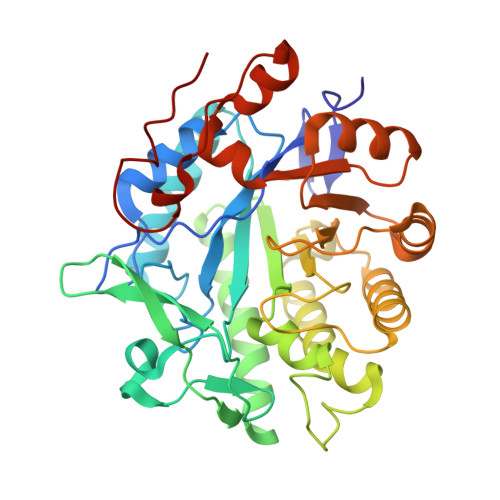Kinetic and Structural Basis of Reactivity of Pentaerythritol Tetranitrate Reductase with Nadph,2-Cyclohexenone Nitroesters and Nitroaromatic Explosives
Khan, H., Harris, R., Barna, T., Craig, D., Bruce, N., Munro, A., Moody, P.C.E., Scrutton, N.(2002) J Biological Chem 277: 21906
- PubMed: 11923299
- DOI: https://doi.org/10.1074/jbc.M200637200
- Primary Citation of Related Structures:
1GVO, 1GVQ, 1GVR, 1GVS - PubMed Abstract:
The reaction of pentaerythritol tetranitrate reductase with reducing and oxidizing substrates has been studied by stopped-flow spectrophotometry, redox potentiometry, and X-ray crystallography. We show in the reductive half-reaction of pentaerythritol tetranitrate (PETN) reductase that NADPH binds to form an enzyme-NADPH charge transfer intermediate prior to hydride transfer from the nicotinamide coenzyme to FMN. In the oxidative half-reaction, the two-electron-reduced enzyme reacts with several substrates including nitroester explosives (glycerol trinitrate and PETN), nitroaromatic explosives (trinitrotoluene (TNT) and picric acid), and alpha,beta-unsaturated carbonyl compounds (2-cyclohexenone). Oxidation of the flavin by the nitroaromatic substrate TNT is kinetically indistinguishable from formation of its hydride-Meisenheimer complex, consistent with a mechanism involving direct nucleophilic attack by hydride from the flavin N5 atom at the electron-deficient aromatic nucleus of the substrate. The crystal structures of complexes of the oxidized enzyme bound to picric acid and TNT are consistent with direct hydride transfer from the reduced flavin to nitroaromatic substrates. The mode of binding the inhibitor 2,4-dinitrophenol (2,4-DNP) is similar to that observed with picric acid and TNT. In this position, however, the aromatic nucleus is not activated for hydride transfer from the flavin N5 atom, thus accounting for the lack of reactivity with 2,4-DNP. Our work with PETN reductase establishes further a close relationship to the Old Yellow Enzyme family of proteins but at the same time highlights important differences compared with the reactivity of Old Yellow Enzyme. Our studies provide a structural and mechanistic rationale for the ability of PETN reductase to react with the nitroaromatic explosive compounds TNT and picric acid and for the inhibition of enzyme activity with 2,4-DNP.
- Department of Biochemistry and Centre for Chemical Biology, University of Leicester, University Road, Leicester LE1 7RH, United Kingdom.
Organizational Affiliation:


















